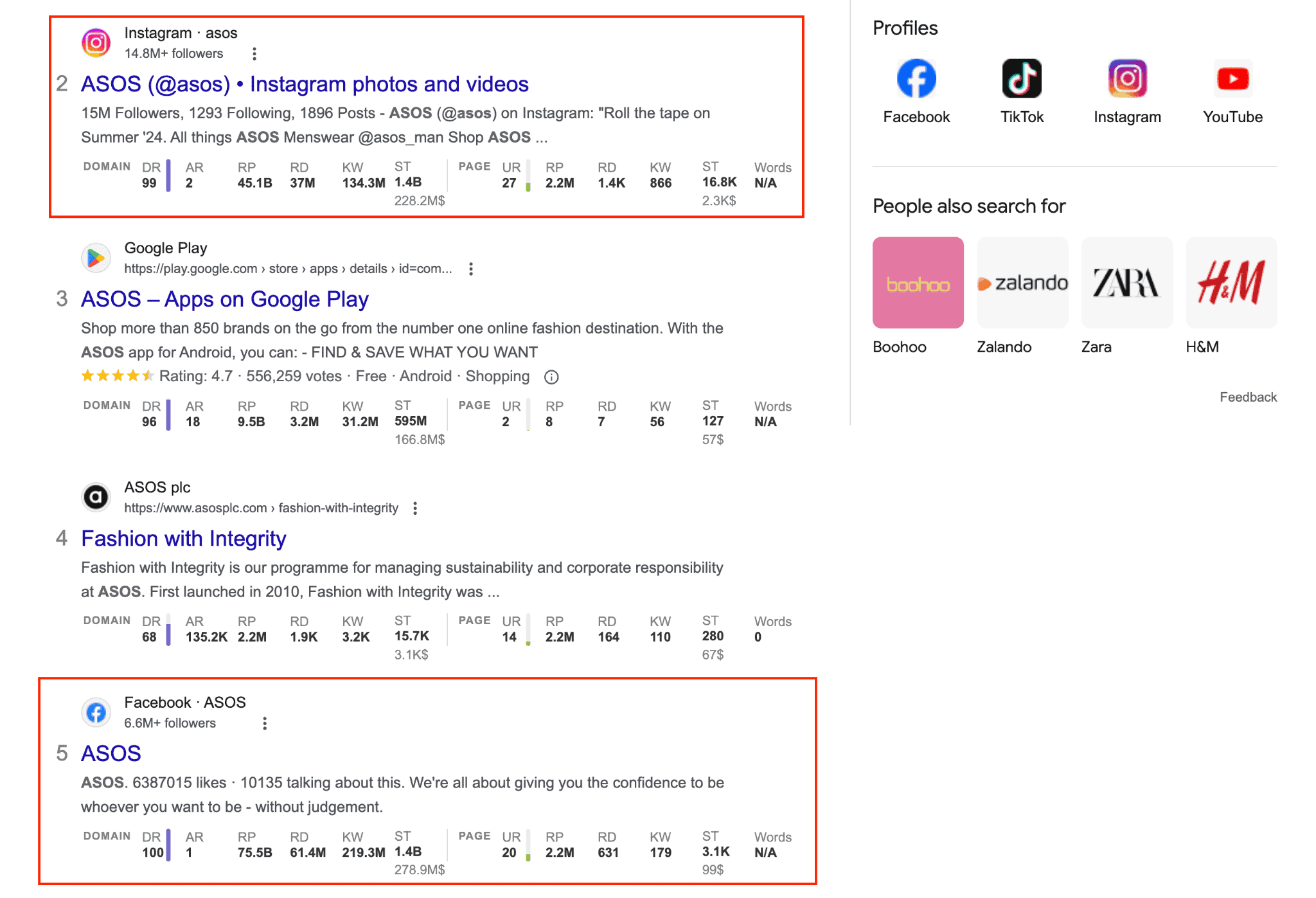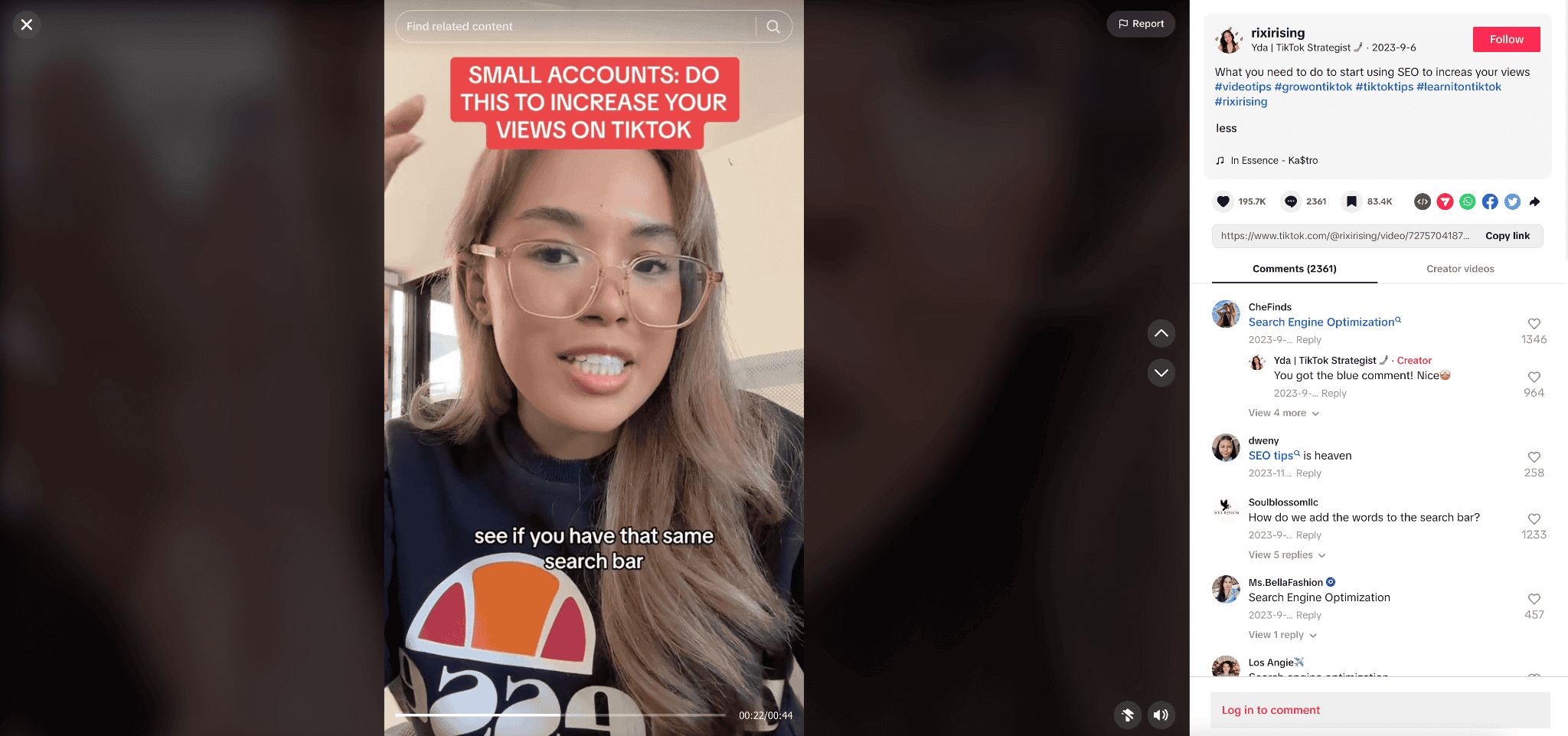The all-encompassing success of Google has made it difficult to look at SEO away from the search giant. However, good search engine optimization has far-reaching potential across the internet, and social media platforms are fast becoming a key alternative way for users to access the information they’re looking for.
While SMSO (social media search optimization) doesn’t quite have the same ring to it as SEO, there’s certainly value in brands seeking to optimize content for social media search engines.
In 2024, there are an estimated 5.17 billion social media users worldwide, while the average person uses 6.7 different social networks per month.
Crucially, 31% of consumers use social media to find the answers to their questions online, and a growing number are beginning to favor social media search over traditional search engines.
Figures show that 31% of Gen-Z internet users prefer social media search, while 28% of Millennials favor social search functions over the likes of Google.
So, what does this mean for brands seeking to build their SEO strategy online? While catering to the whims of Google remains imperative, you should also seek to optimize content to boost your presence on social networks.
With this in mind, let’s explore the benefits of mastering SEO beyond Google and reveal five key ways to master the art of social media search optimization.
What Does SEO Beyond Google Look Like?
When it comes to SEO, most of us are used to pouring focus into our website design, copy keywords, and ranking on search engines.
However, what if we told you that building up your SERP score could go beyond classic website optimization?
Search engine optimization can come from all angles. While a large chunk of your ranking comes from your website, there are a few other things you can do to see your ranking rise on Google.
When ranking a brand online, Google takes numerous factors into consideration that are totally unlinked to your website. These include:
- Social Media Following/Engagement: While your social following is not a direct ranking factor, platforms with large followings are not only more likely to be connected to a high-ranking website, but the social account itself gains a high ranking in a SERP result.
- Mobile Responsiveness: Nine in ten internet users now access the web via a mobile device. Mobile responsiveness has now become a key factor Google considers when ranking a website. Smartphone users need to be able to access your site easily, and your content should be made with numerous devices in mind.
- Brand Mentions Across The Web: If your brand name constantly pops up online, Google is twice as likely to rank you as an authoritative player. These mentions come from other brand blogs, social shares and even reviews, but they can make a difference to your SEO score as they start to stack up.
- Customer Reviews and Recommendations: Customer reviews are also a ranking factor in themselves. While there is not a direct correlation between customer reviews and your Google ranking, brands that are reviewed more frequently tend to have a higher SERP score just because they become more well-known within niche communities. This increases site clicks and searches, in turn raising a brand’s SERP score.
As you can see from the examples listed above, search engine optimization certainly goes beyond your website and often beyond Google itself.
Also, as AI-driven search engines reshape content discovery, businesses must adapt their strategies. Generative engine optimization (GEO) focuses on optimizing content for AI-powered platforms like ChatGPT and Google’s Gemini, ensuring better visibility in evolving search environments.
Today, we’re taking a deeper dive into the benefits of using your social profiles to boost your SEO score online.
Let’s have a closer look at some of the key advantages adopting social media SEO practices could have for your SERP result in 2024.
Benefits of Mastering Social SEO
Poruing focus on your social media search optimization has a direct impact on your website SEO.
Mastering the art of getting to the top of the social search bar aids your platform’s growth within the social sphere while also creating a new opportunity for your brand to rank online as a social-based site result.
Take this example from ASOS. While their website ranks at the top of the search when looking up the company on Google, their well-maintained Instagram and Facebook platforms are also right at the top of the SERP result:

This is just one benefit of prioritizing your social search SEO. Well-ranking social platforms give your brand even more chances to appear in the SERPs and twice the visibility online.
Social SEO also has benefits of its own. Here are some of the advantages your band could see on social media when introducing a social search optimization strategy:
- Higher levels of engagement
- A larger following online
- Audience loyalty
- Viral content and increased sharing of content
- More brand mentions across numerous social media platforms
- Growth across all social media platforms
With this in mind, we’ve put together five enthralling strategies that aim to improve your social search score in 2024
5 Ways to Master the Art of Social Media Search Optimization
Master Effective Hashtagging
In recent years, hashtags have evolved from their emergence as a social media trend to a tangible means of boosting visibility and engagement online.
Hashtags can help users quickly identify what they’re looking for and access vast amounts of information regarding their chosen buzzwords. These optimization tools can come in many different forms, including:
- Branded hashtags: These can be unique to your business, and will enhance your brand identity and recognition. Branded hashtags can be great for utilizing user-generated content (UGC) for your brand.
- Community hashtags: Instead of being exclusive to your business, community hashtags can help brands connect with a wider community. #ThrowbackThursday, for instance, can help to build more direct connections globally.
- Trending hashtags: Another strong hashtag for SEO purposes is the trending hashtag. These are the allocated hashtags for popular events and seasonal social trends. The upcoming Olympic Games in Paris, for instance, has been handed the #Paris2024 hashtag.
- Location hashtags: These are great for locally-focused businesses. Hashtags like #LondonRunners are an example of how local runners can connect and can offer opportunities for businesses to work on appealing to a specific target audience.
Although there are many different hashtags out there, brands need to keep things relevant at all times to their post and brand. You should always look to avoid cramming hashtags into posts for the sake of it–otherwise, you run the risk of overwhelming your audience and losing relevance to their specific searches.

You’ll also need to keep on the lookout for trending hashtags and update your strategy regularly. You can do this by reviewing the successful use of hashtags among your competitors. In the example above, we can see how a TikTok SEO influencer has utilized their hashtags to promote an upload.
With almost 200k likes at the time of writing, a total that surpasses the user’s follower count, it’s clear that strategic hashtags can work wonders in expanding the reach of users.
It’s also worth using free analytics tools like Display Purposes, All Hashtag, and Instagram Insights for Instagram accounts. These platforms can help users quickly identify the most appropriate hashtags to use and how to utilize them best.
Include Newsjacking in Your Strategy
Newsjacking is another excellent tool for brands to build their presence on social media search results.
According to Ofcom data, 47% of adults in the United Kingdom use social media to follow news stories–this means that there’s a significant audience available for brands to tap into through effective newsjacking.
So, what exactly is newsjacking? This is the name given when brands utilize news stories to grow their presence by using them to drive engagement on social media.
There are many ways in which your brand can utilize newsjacking. Whether you’re sharing your thoughts on an industry-specific story or adding a sense of humor to a lighthearted trending news item, there are many possibilities to generate exposure through this social media approach.

One example of effective newsjacking can be found in the British Museum’s use of the #LondonMarathon hashtag on the day of the annual event. In referencing the marathon itself using the hashtag and creatively using the trending story to make it relevant to its own industry, the post on X became the British Museum’s most successful throughout April 2024.
Utilize Social Listening
Social listening is a great way for brands to optimize their exposure on social media simply by listening in and acting on the insights that users provide.
Brands can benefit from social listening by learning from audience sentiment and converting it into better-targeted content, actionable business insights, and greater conversion rates.
By taking the time to use social media search functions, you can uncover new sentiment-related insights into how your target audience feels about your business, the quality of your existing marketing strategies, and what leads would like to see more of in future campaigns.
You can also conduct social listening to uncover wider industry talking points which can be converted into more discoverable posts and content and SEO strategies that enhance visibility.
At its core, social listening works similarly to keyword research in SEO and can help you understand the queries that users are unable to find answers to on social media networks. This provides you with the opportunity to provide answers that drive more engagement than your rivals.
Although this can be a time-consuming process for startups and SMEs, it’s entirely possible to enlist the help of a dedicated SEO agency that specializes in social media marketing and growing the presence of businesses online. Alternatively, consider partnering with a specialized SaaS SEO agency for tailored expertise in scaling your online presence.
Build Your Community
The beauty of social media is that it offers a platform for brands to interact directly with their community of followers. In terms of generating marketing advantages, this can be extremely beneficial for a number of reasons online.
Firstly, in engaging directly with your followers, it’s possible to build greater levels of trust, loyalty, and advocacy among your customers. This means that you’re more likely to improve your conversion rates through the positive experiences you provide your community.
Secondly, actively starting a conversation among your followers can help to make you far more discoverable on social media search functions without having to commit to extensive posting and content creation.

One example of a social media brand that builds a strong rapport with its community is Dunkin’ Donuts. Above, we can see how the brand actively engages with follower comments to keep the conversation going and make one of its products more discoverable on Instagram’s search feature.
Position Yourself as an Industry Thought Leader
The power of the industry thought leader is strong. According to a LinkedIn Marketing Solutions study, 57% of buyers say that thought leadership builds awareness for new or lesser-known brands, while 53% believe that it’s important for small and new companies to produce thought leadership for buyers to consider working with them.
Social media forms the perfect platform for thought leadership among brands. This is because it can be a great way of combining many of the approaches we’ve already covered, including newsjacking, social listening, and hashtagging.

Thought leadership can take many forms on social media. In the example above, we can see how Home Depot has used the approach to underline the firm’s commitment to sustainable practices. This helps to educate followers while underlining Home Depot’s industry knowledge and understanding of sustainability in its industry.
Other approaches to thought leadership can involve sharing insights on emerging news stories surrounding your industry, adding your thoughts to popular posts from other industry influencers or brands, or simply running social media tutorials for how your brand works.
Building a Sustainable Social Media Optimization Strategy
Particularly for brands with a younger target audience, it’s crucial that you cater to the growing number of users utilizing social media search functions to find answers to their queries.
This revolves around building your social media presence and refining your social media listening skills to create content and establish the brand value that your audience is looking for.
By optimizing for SMSO, you’ll find key benefits to your overall SEO strategy and will continue to win leads from this approach long into the future.

